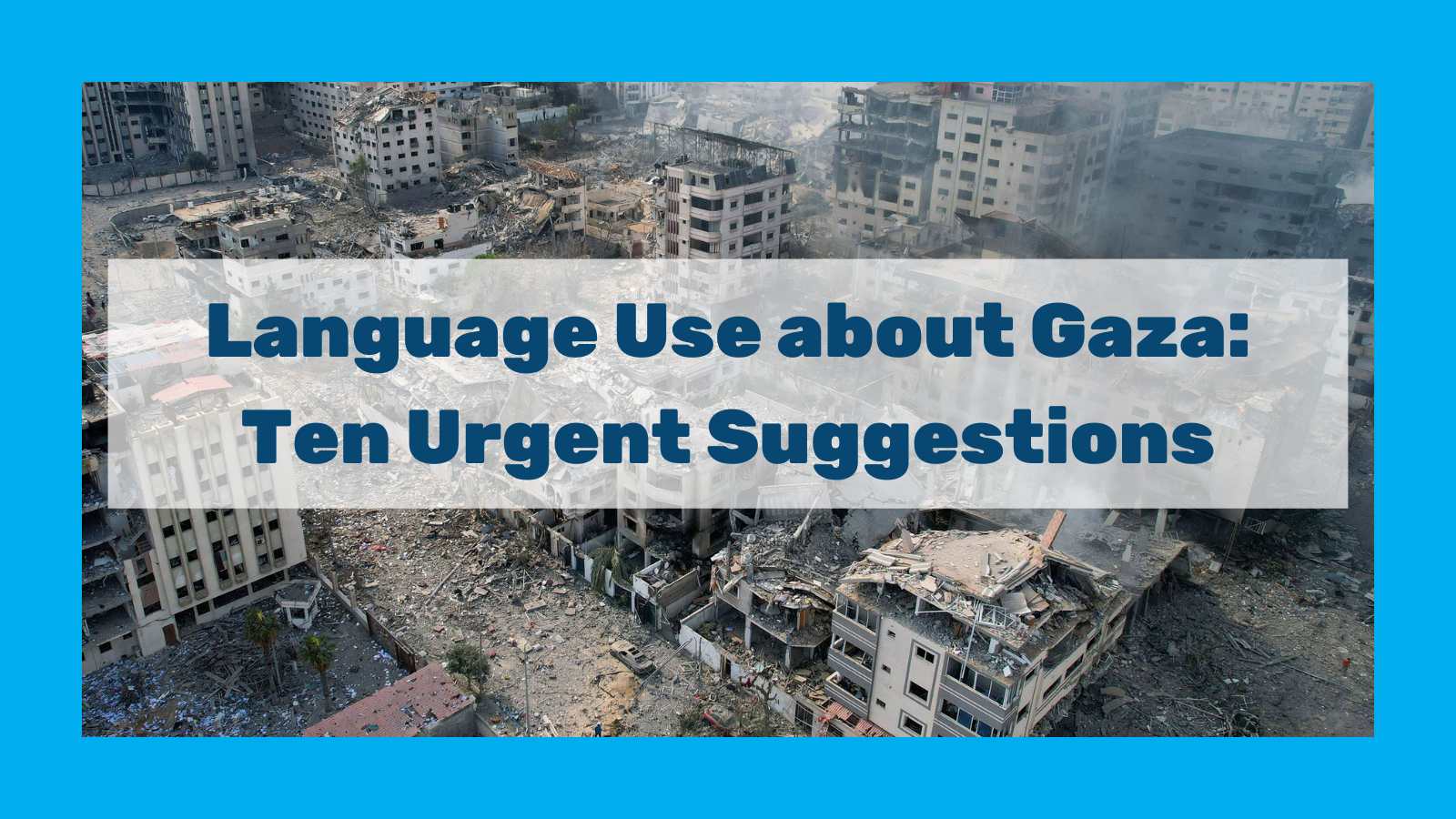By Words About War, February 9, 2024
On January 26, 2024, the International Court of Justice ruled that South Africa’s genocide case can proceed, deeming it plausible that Israel is committing genocide. Even while the global consensus shifts against the U.S.-backed Israeli genocide of Palestinians, many global institutions will be slow to call the violence what it is. The legal process will take years, while the mass killing of Palestinians continues daily. Following Palestinians, we encourage others to call the war waged against them a genocide without delay. We do so both because of the term’s accuracy and because this is a genocide built on language that perpetuates, sustains, and legitimizes the ongoing violence.
While exposing the genocide of Palestinians, it is critical to continually challenge and resist language that is used to justify the violence and render Palestinians killable. To this end, we offer 10 urgent suggestions. Above all we advise using clear, accurate, honest language that describes the flesh and bone impacts of this mass violence. We urge the use of language that centers the humanity of those harmed while resisting simplistic, binary us vs. them, good vs. evil narratives that continue to be circulated by governments and media, humanizing some and dehumanizing others. More suggestions are at: wordsaboutwar.org
1. Israel is a settler-colony, an occupying power.
The Israeli government’s narrative that it has a right to defend itself erases the fact that it is not just a state, it is a settler-colony and occupying force. As an occupying power, Israel is obligated under international law to protect people (the Palestinians) under its control, not claim it has a right to defend itself by indiscriminately killing those it occupies.
2. Don’t conflate a government with a people.
Don’t talk about Palestinians or Israelis as homogenous groups.
3. Don’t use terrorism or terrorists.
The terms have no clear definitions, have Islamophobic connotations, and do not get applied to the terror of states. Name the actions of groups using violence. Use: acts of mass violence, attacks on civilians, militants, and the names of armed groups.
4. Killed, murdered, or dead?
Many describe Palestinians as dead while Israelis are killed, murdered, and massacred (“1,200 Israelis killed; 27,000 dead in Gaza”). Dead/deaths erases responsibility for killing. War is killing, war is murder. Palestinians are not just dead, they are murdered and killed by the US-backed Israeli genocide.
5. Don’t use language that humanizes some and dehumanizes others.
For example, don’t use words such as “horrific” to describe the violence of one group (“Hamas launched horrific attacks”) and name the victims (“against Israeli women, children, and elderly”) while, by contrast, failing to characterize Israel’s violence as “horrific” and referring to victims only as civilians (“Palestinian civilians were killed”).
6. Always critique government talking points justifying violence.
State narratives frequently justify the violence states enact, particularly when a state is committing or supporting a genocide and other acts of mass violence. This is what George Orwell calls “the defense of the indefensible.”
7. Don’t use surgical or precision strikes.
War is never surgical, hygienic, or clean, nor is genocide.
8. Avoid passive verbs (were killed, were murdered).
Say who is doing what, who is killing whom. For example, “The Israeli military killed 15 Palestinian children in Khan Younis today.”
9. Criticizing Israel and its genocide is not antisemitic.
While antisemitism is a real and growing problem globally, don’t confuse actual antisemitism with expressions of support for the Palestinian struggle against Israeli occupation, Israeli apartheid, and the US-backed Israeli genocide of Palestinians.
10. How you name violence matters.
UN officials, legal advocacy groups, and international law scholars decidedly agree that this is a genocide, defined as “acts committed with intent to destroy, in whole or in part, a national, ethnical, racial or religious group.”
Terms such as war and conflict obscure who is responsible for the genocide, the scope of the destruction, and the difference in power between an occupying state and those it occupies. For example, Israeli leaders say they are engaged in a war against Hamas. Events prove and experts agree that Israel is engaged in a war on the Palestinian people–a war of annihilation that constitutes a genocide in Gaza.
If using the term humanitarian crisis, be clear that the Israeli government bears responsibility for creating a crisis through its genocide of Palestinians.










One Response
Thank you for this ❤️